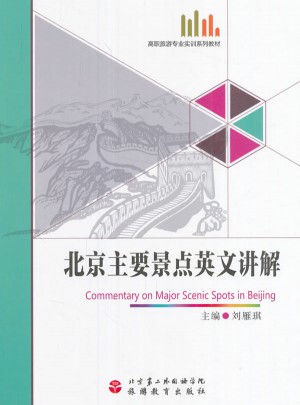
北京主要景點英文講解
- 所屬分類:圖書 >外語>行業(yè)英語>餐飲旅游業(yè)英語
- 作者:[劉雁琪]編
- 產(chǎn)品參數(shù):
- 叢書名:--
- 國際刊號:9787563734757
- 出版社:旅游教育出版社
- 出版時間:2016-11
- 印刷時間:2016-11-01
- 版次:1
- 開本:16開
- 頁數(shù):--
- 紙張:膠版紙
- 包裝:平裝-膠訂
- 套裝:否

《北京主要景點英文講解》分11個單元對北京地區(qū)11個主要景點(天安門、故宮、長城、天壇、頤和園、明十三陵、北海公園、雍和宮、景山公園、恭王府、什剎海和胡同)進行了詳細的介紹。每單元均由三個模塊構(gòu)成:課前熱身模塊,旨在喚醒學(xué)生的求知欲,激發(fā)他們的學(xué)習(xí)興趣;課文主體的閱讀活動對主要景點進行了詳細的介紹;課后練習(xí)模塊,能幫助學(xué)生檢測學(xué)習(xí)效果,方便學(xué)生進行自我提高訓(xùn)練。另外,《北京主要景點英文講解》在前6個單元還精心設(shè)計了北京地區(qū)6大景點的導(dǎo)游詞范例,供學(xué)習(xí)者參考模仿。附錄部分是針對外國游客通常可能提出的問題而設(shè)置的問答知識。
Unit 1 天安門及天安門廣場
天安門
明清時期的天安門廣場
今日天安門廣場
天安門導(dǎo)游詞范例
Unit2 故宮
歷史沿革
中軸線
西路
東路
故宮導(dǎo)游詞范例
Unit3 天壇
歷史沿革
建筑規(guī)制
功能
今日的天壇
天壇主要建筑
天壇導(dǎo)游詞范例
Unit 4 頤和園
園內(nèi)主要景點
園內(nèi)其他景點
頤和園導(dǎo)游詞范例
Unit 5 長城
歷史沿革
基本構(gòu)造和營建
長城在歷史上的作用
八達嶺長城
長城導(dǎo)游詞范例
Unit 6 明十三陵
歷史沿革
神路
長陵
定陵
明十三陵導(dǎo)游詞范例
Unit 7 北海
Unit 8 雍和宮
Unit 9 景山公園
Unit 10 恭王府
Unit 11 什剎海和胡同
景點知識問答
參考文獻
《北京主要景點英文講解》:
Ladies and gentlemen:
The Palace Museum, also known as the Forbidden City, is Located in the center of Beijing. ActualLy it was the imperial palace for the emperor and served as both Livnng quarters and the venue of the state administration during the Ming and Qing dynasties. Its name, on the one hand, comes from ancient Chinese astronomers' belief that Heavenly emperor's abode or the Purple Palace, the pivot of the celestial world, is Located in the Pole Star, at the center of the heaven. Hence, as the Son of Heaven, the emperor should Live in the Purple City. On the other hand, except for palace maids, eunuches and guards, ordinary citizens without special orders of the emperor were prohibited from entering the Forbidden City. Therefore, palaces during the Ming and Qing dynasties are called both the Forbidden City and the Purple City.
It took 14 years to complete the magnificent palace. Construction began in 1406 and was finished in 1420. In the following year (1421) the capital of the Ming Dynasty was moved from Nanjing to Beijing. Starting from the third emperor of the Ming Zhu Di to the last emperor of the Qing Puyi, altogether 24 emperors lived here for a total of 491 years. 14 of them were Ming emperors and 10 were Qing emperors.
The Palace Museum covers an area of 72 hectares with a total floor space of about 163,000 square meters. It is rectangular in shape, 960 meters Long from north to south and 750 meters wide from east to west with a 10-meter-high city wall surrounded and encircled by a 52-meter-wide moat. At each corner of the surrounding wall, there is a magnificent watchtower which was heavily guarded in the old days.
The Palace Museum now consists of more than 90 palaces and courtyards,980 buildings with rooms of 8,704. Most of the structures in the Forbidden City were made of wood with white marbLe, stone or brick foundations. The building materials were from many parts of our country. The timbers came from Sichuan, Guizhou, Guangxi, Hunan and Yunnan provinces in southwest China. But during the Qing Dynasty, the timbers were transported from northeast China. Other construction materials, including bricks, stones and times, were used by both dynasties. The golden bricks that paved the halls were manufactured in Suzhou, refined bricks used to build the foundation of halls were made in Linqing, and Limes came from Yizhou. White marble was provided regularly by Fangshan County and glazed tiles by Sanjiadian.
The Forbidden City can be divided into two parts: the Outer Court and the Inner Palace. The Outer Court consists of three main buildings where the emperors attended the grand ceremonies and conducted the state affairs. The Inner Palace is composed of three rear main buildings and six eastern palaces and six western palaces where the emperors used to handle daily affairs and the Living quarters for the emperor, empress and imperial concubines.
The Palace Museum is the best-preserved imperial palace in China and the Largest ancient palatial structure in the world. In 1987 it was listed as the world cultural heritage by UNESCO.
The Meridian Gate is the main entrance to the Forbidden City. It is calLed Meridian Gate because the emperor believed that the meridian Line went right through the Forbidden City and his imperial residence was the center of the whole universe. It is 35.6 meters high with five towers on the top, so it is also nicknamed as the "Five Phoenix Towers".
The Meridian Gate was the place to announce the new Lunar year calendar on the first day of 10th Lunar month every year. Lanterns would also be hung up on the Meridian Gate on the 15th day of the first Lunar month during the Ming Dynasty, when all the officials would have a feast in the Forbidden City and ordinary citizens would go to the Meridian Gate to Look at the beautiful Lanterns. When a general returned from battle, the ceremony of "Accepting Captives of War" was held here. The "Court Beating" also took place here.
……
有外國朋友要來北京玩兒,我怕自己應(yīng)付不了景點講解,讓她自學(xué)成才吧。
東西很好,物流方面也不粗暴,這次的東西很好沒有任何損壞。唯一遺憾的就是想再買的時候居然漲價了,雖然漲的不明顯,不過東西真的不錯。很滿意
這本書出看是可以接受的,內(nèi)容景點表述不是很復(fù)雜,遺憾沒有語音,建議應(yīng)該給配備cd,這樣更容易練習(xí),我想考初級應(yīng)該夠用了。比另一本厚的貴的容易理解!努力堅持!